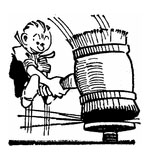
Why Catholic Orthodoxy Is Not ‘Catholic Fundamentalism’
THE CASE OF THE MISSING POSITION
One of the saddest features of contemporary Catholicism is the wide range of accusations hurled at Catholics by Catholics. Traditional Catholics are increasingly caricatured as close-minded fundamentalists, while those of a revisionist tendency are caricatured as skeptics. By skeptics I mean those skeptical toward the central dogmatic claims of the faith — they do not genuinely believe the Creed, they reduce the Sacraments to symbol only, and the like. By Catholic fundamentalists I mean those who have little or no appreciation for key distinctions made in the tradition, such as those between infallible and non-infallible doctrine or between points of doctrine and points of custom or discipline.
Most revisionists see themselves as moderates. Between the extremes of excessive dogmatism and skeptical subjectivism, they see themselves as offering a compassionate middle ground that remains in continuity with the tradition while gently reforming it. Avery Dulles articulated the moderate position this way:
The moderates hold the key to the future. Neither the extreme traditionalist nor the extreme modernist position can come through with a positive program that holds out any prospects of success in the long run. A restoration of consensus demands an enlargement of the moderate center, which insists upon discipline and restraint but rejects blindness and rigidity.
Though written in 1970, and though Dulles himself may have changed his mind, this description remains an apt one for moderates. It is also a partially deficient sketch of the available options: It has the effect of virtually eliminating a position, Catholic orthodoxy, which is not, as we shall see, one “position” alongside others.
You May Also Enjoy
A new Vatican document makes it clear that the old Latin and new vernacular Masses are both valid, a distinct refusal of liturgical absolutism.
As we mark the two-year anniversary of Jorge Bergoglio's election to the papacy, the extended honeymoon period with liberal Catholics that he enjoyed is coming to a bitter close.
Catholic orthodoxy is the foundation and not a middle spot between "models." Skepticism, revisionism, and fundamentalism are ideologically tinged deviations from the full truth.

